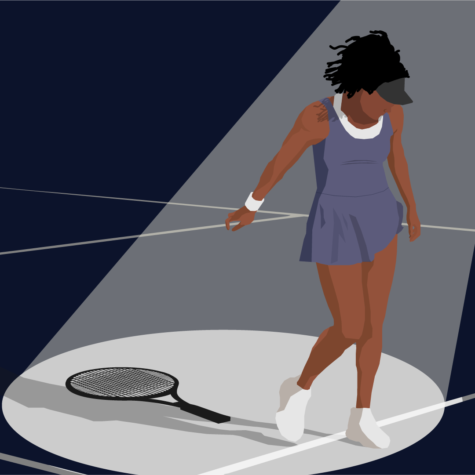From the Basement | Demystifying mental health in sports
October 6, 2021

In recent years, the conversation around mental health has grown as more athletes began to speak out about their experiences. With two high-profile athletes, American gymnast Simone Biles and Japanese tennis player Naomi Osaka, taking a public stance about prioritizing their mental health over their athletic careers, the conversation about mental health is at the forefront of the sports world.
Perhaps it is too unfair to lump athletes with mental health struggles into the same category. Mental health is a wide spectrum, and athletes face different challenges and diagnoses. Houston Astros pitcher Zack Greinke faces severe social anxiety. Greinke’s anxiety is bad enough that he prefers pitching in empty stadiums rather than full ones. Former AFC Fiorentina manager Cesare Prandelli resigned from his job due to a “dark cloud” inside him and that he was experiencing “profound distress which is preventing me from being who I really am.”
Fortunately, many of these people receive substantial support from sports leagues, clubs and fans. After Prandelli’s resignation, Fiorentina fans put up a banner outside the stadium reading, “The man comes before the coach, / We will always be proud of your love!” In hockey, the Vancouver Canucks provided defenseman Tyler Motte resources in the Vancouver area to help with his anxiety and depression.
Firenze. I Tifosi della Fiorentina. Niente da aggiungere. #Prandelli @TgrRaiToscana pic.twitter.com/E3CkdIgEj2
— Sara Meini (@SaraMeini) March 25, 2021
Vegas Golden Knights goaltender Robin Lehner attempted to self medicate his Bipolar I disorder, Attention-deficit/hyperactivity disorder and post-traumatic stress with alcohol and sleeping pills. He entered the NHL Substance Abuse and Behavioral Health Program, which is a confidential program to get clean without the league knowing which players are in it.
Professional athletes admitting their mental health struggles is a poignant reminder that they are humans as well. For these players, success does not dictate whether or not they may have a mental health struggle. For example, Biles won seven Olympic medals, four of them gold. Osaka has four Grand Slam wins and is ranked as the eighth best woman in the world. Just because these athletes may have success in their athletic careers, it does not mean that their life is perfect in every area.
Despite more athletes opening up to mental health, many still face criticism from fans and the media for talking about their mental health. In a playoff game in 2019 against the New York Yankees, several Yankee fans taunted Greinke about his social anxiety disorder. Fans called Biles a quitter and selfish after she withdrew from several Olympic events to prioritize her mental health.
Cleveland Cavaliers power forward Kevin Love opened up about his struggle with depression, and how many people do not understand how hard it is to function. “What people on the outside don’t always understand is that it takes all of your strength and willpower just to exist. Just to keep on going. Battling depression, battling anxiety, battling any mental health disorder … it’s all just so unbelievably exhausting.”
The high pressure that professional athletes endure certainly does them no favors for their mental health. Fans, the media and the players themselves demand the best out of themselves and their teams in order to achieve glory. “It was like I was trying to achieve my way out of depression,” Love said.
Dallas Cowboys quarterback Dak Prescott received no sympathy from FOX Sports commentator Skip Bayless after Prescott went public with his battle with depression following the suicide of his brother, Jace Prescott.
“He’s the quarterback of [the Dallas Cowboys]. The sport that he plays is dog-eat-dog. It is no compassion, no quarter given on the football field. If you reveal publicly any little weakness, it can affect your team’s ability to believe in you in the toughest spot,” Bayless said. Bayless was widely condemned for this statement, including rebuttals from FOX Sports and Prescott himself.
With social media becoming an ever more present part of sports, and with each season seemingly bringing higher stakes, it is important to remember that these athletes are human beings too. Success does not guarantee that an athlete is safe from dealing with mental health struggles. Former Arsenal FC midfielder Jack Wilshere summed it up best — “the depressive thoughts don’t care if you’re a footballer. I think it’s important to speak out.”
For Tulane students in need of support, contact Counseling and Psychological Services at 504-314-2277. The Counseling Center is open 8:30 a.m. to 5 p.m. Monday–Friday. The Counseling Center provides mental health counseling and other related services.
Students in need of additional support can contact the Residential Adviser on call in their residence hall. Students may also call the on-call Case Manager at 504-920-9900.
For LGBTQ+ students, the Trevor Project provides crisis intervention and suicide prevention services to those under 25 and can be reached at 866-488-7386.
The Employee Assistance Program is available for faculty and staff seeking counseling or support. Information about Employee Assistance Programs can be found at https://hr.tulane.edu/benefits/employee-assistance-program.
The National Suicide Prevention Lifeline can be reached 24 hours a day at 800-273-8255.






















Leave a Comment